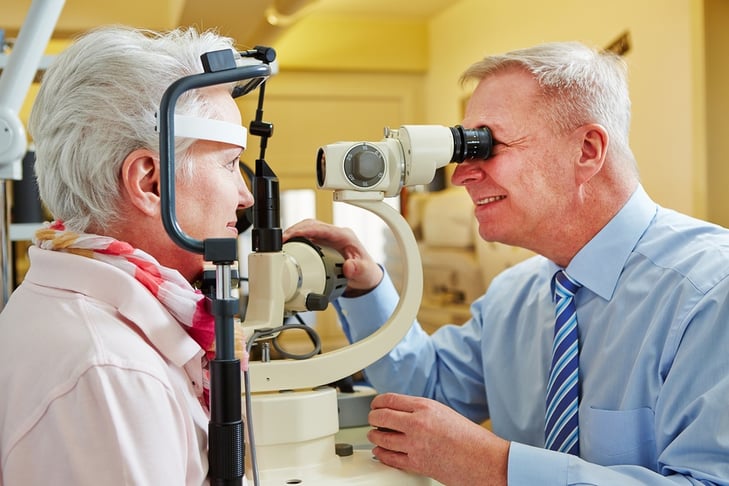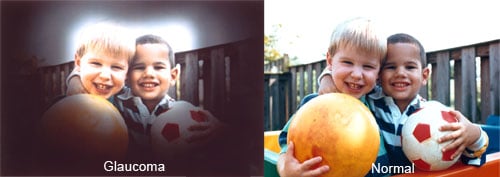January is National Glaucoma Awareness Month, so we thought we should take a moment today to pass along five facts Cincinnati seniors should know about the dangerous eye condition. We’ll also give you tips you can use to protect your vision and maintain good eye health.
What is glaucoma and why is it such a concern?
Your eyes each contain a small amount of watery fluid — called the “aqueous humour” — which provides intraocular pressure to keep the globes of your eyes filled. Aqueous humour also provides nutrition and immune cell access to your ocular tissues. It’s continually replenished and drains out of microscopic outlets at the base of your eye.
Classic glaucoma is a dangerous build-up of intraocular pressure, due either to an excess of aqueous humour, or due to overall high blood pressure.
There are two types of classic glaucoma. The most common is open-angle, which develops slowly over a period of months or years and is usually painless. Less common is the closed-angle variety, which can develop suddenly (usually due to eye trauma or abrupt changes in blood pressure) over weeks or days and is usually intensely painful.
There are also conditions like normal-tension glaucoma (optic neuropathy) which mimic true glaucoma, but lack the elevation in internal eye pressure characteristic of open-angle and closed-angle.
Secondary glaucoma can be caused by eye disease or by chronic steroid use. Diabetic retinopathy — a significant risk for seniors who are overweight are genetically predisposed to develop diabetes — can cause glaucoma-like pain and vision loss. And, for some people, glaucoma-like conditions can be congenital.
All types of glaucoma are dangerous because they can cause irreversible vision loss. It’s important for you to see your optometrist or ophthalmologist every year to screen for glaucoma and, if detected, to treat it early.
5 important facts about glaucoma
1. The World Health Organization reported that glaucoma is the second leading cause of blindness worldwide.
2. Glaucoma accounts for 9 percent to 12 percent of all blindness cases in the United States, per a 1997 study by Quigley and Vitale.
3. About half of people suffering from glaucoma have no idea they have it, the U.S. Centers for Disease Control & Prevention (CDC) reported.
4. Glaucoma is more common among African-Americans than among white Americans, and is chronically underdiagnosed and undertreated in the black community, according to a study published in the New England Journal of Medicine by Javitt, et al.
5. A survey conducted on behalf of the Glaucoma Research Foundation found that less than half of adult Americans receive an annual dilated eye exam — reportedly the most effective test for detecting glaucoma.
Protect your vision with these simple steps
Anyone can develop glaucoma. But obese people, diabetics, people with high blood pressure, seniors and African-Americans are at significantly higher risk to suffer from glaucoma-related vision loss. Here’s what seniors can do to protect their eyesight:
- Watch your weight. Maintaining a healthy body weight lowers your risk of developing diabetes or high blood pressure which, in turn, decreases your likelihood of developing classic glaucoma or glaucoma-like retinopathy. Stick to a low-fat, low-calorie diet and be sure to exercise regularly.
- Closely monitor your blood pressure. If you have hypertension, or if you are overweight, check your pressure every morning and every night (you can purchase a home blood pressure monitor at your local pharmacy — insurance often covers their cost if prescribed by your doctor, so check with your insurance provider). Keep a log of your pressures and see your doctor if your pressure spikes, or if you have chronically elevated pressures.
- Control your blood pressure. Regular exercise, low-sodium and low-calorie diets can help you control your blood pressure and minimize the risk of developing hypertension-related glaucoma. If your doctor prescribes anti-hypertensive medications for you, be sure not to miss doses and to see your physician for regular rechecks.
- Have a dilated eye exam every year. Make sure that you see your optometrist or ophthalmologist every year for an eye exam, and that he or she tests you for glaucoma.
If you’re a senior in Cincinnati who is at higher risk of developing glaucoma, follow the steps above to maintain your eye health. And, if you don’t already have one scheduled, National Glaucoma Awareness Month is an excellent cause to get your annual eye exam on the calendar!














